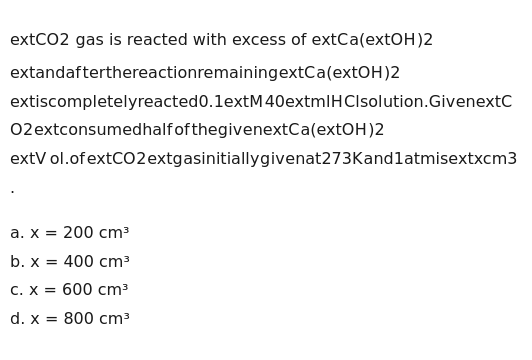Question
Question: \( ext{CO}_{2}\) gas is reacted with excess of \( ext{Ca}( ext{OH})_{2} ext{ and after the reaction...
extCO2 gas is reacted with excess of extCa(extOH)2extandafterthereactionremainingextCa(extOH)2extiscompletelyreacted0.1extM40extmlHClsolution.GivenextCO2extconsumedhalfofthegivenextCa(extOH)2extVol.ofextCO2extgasinitiallygivenat273Kand1atmisextxcm3.

x = 800 cm³
Solution
The reaction of CO2 with Ca(OH)2 produces CaCO3. The moles of Ca(OH)2 reacted can be calculated from the HCl used. Since 0.1 M HCl is used, the moles of HCl = 0.1 * 0.04 = 0.004 moles. This means 0.004 moles of Ca(OH)2 were neutralized, which corresponds to 0.004 moles of CaCO3 produced. Since CO2 consumed half of the Ca(OH)2, the initial moles of Ca(OH)2 = 0.008 moles. The volume of CO2 at STP can be calculated using the ideal gas law: V = nRT/P. Substituting n = 0.008, R = 0.0821 L atm/(K mol), T = 273 K, and P = 1 atm gives V = 0.8 L = 800 cm³.
